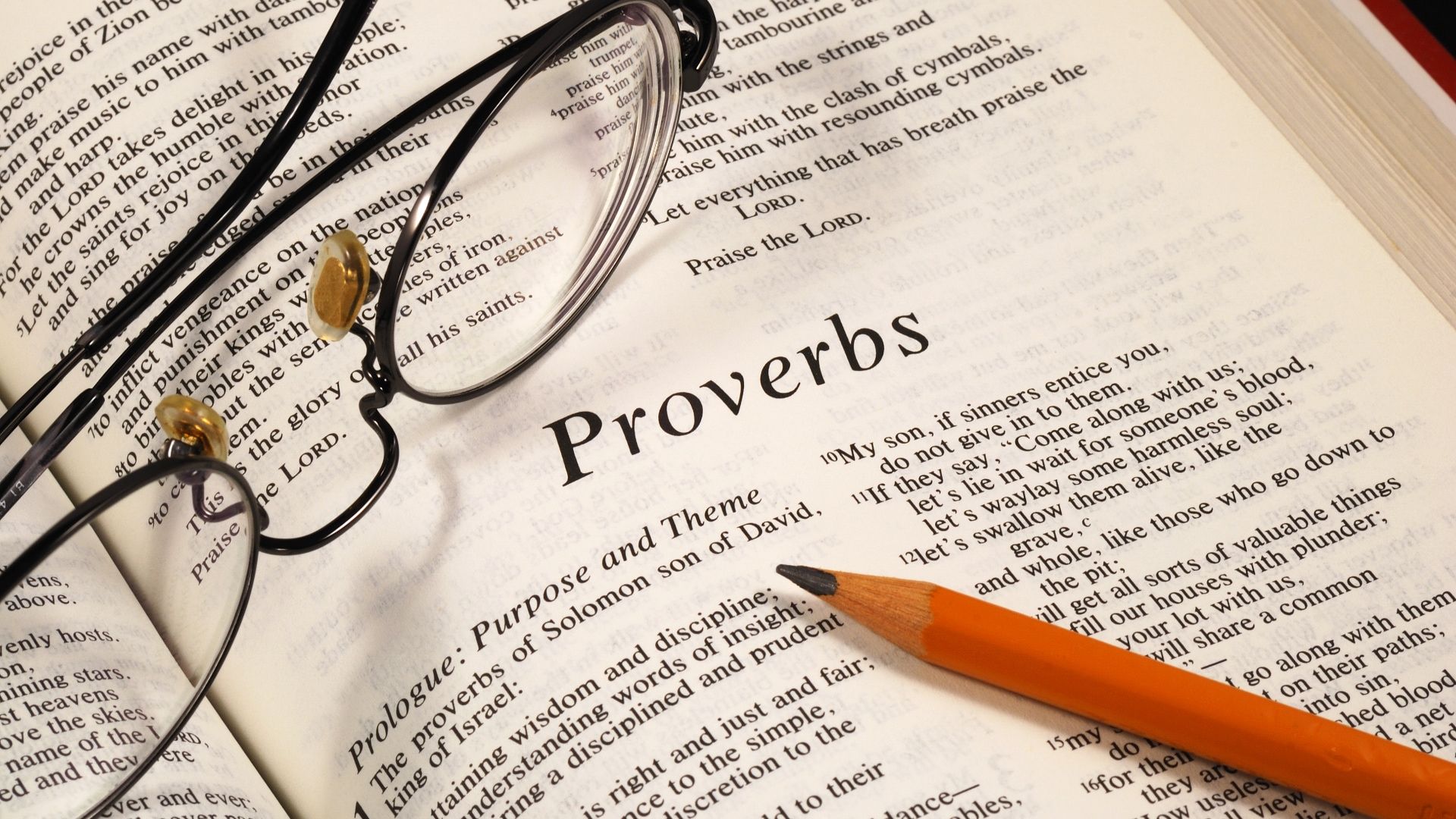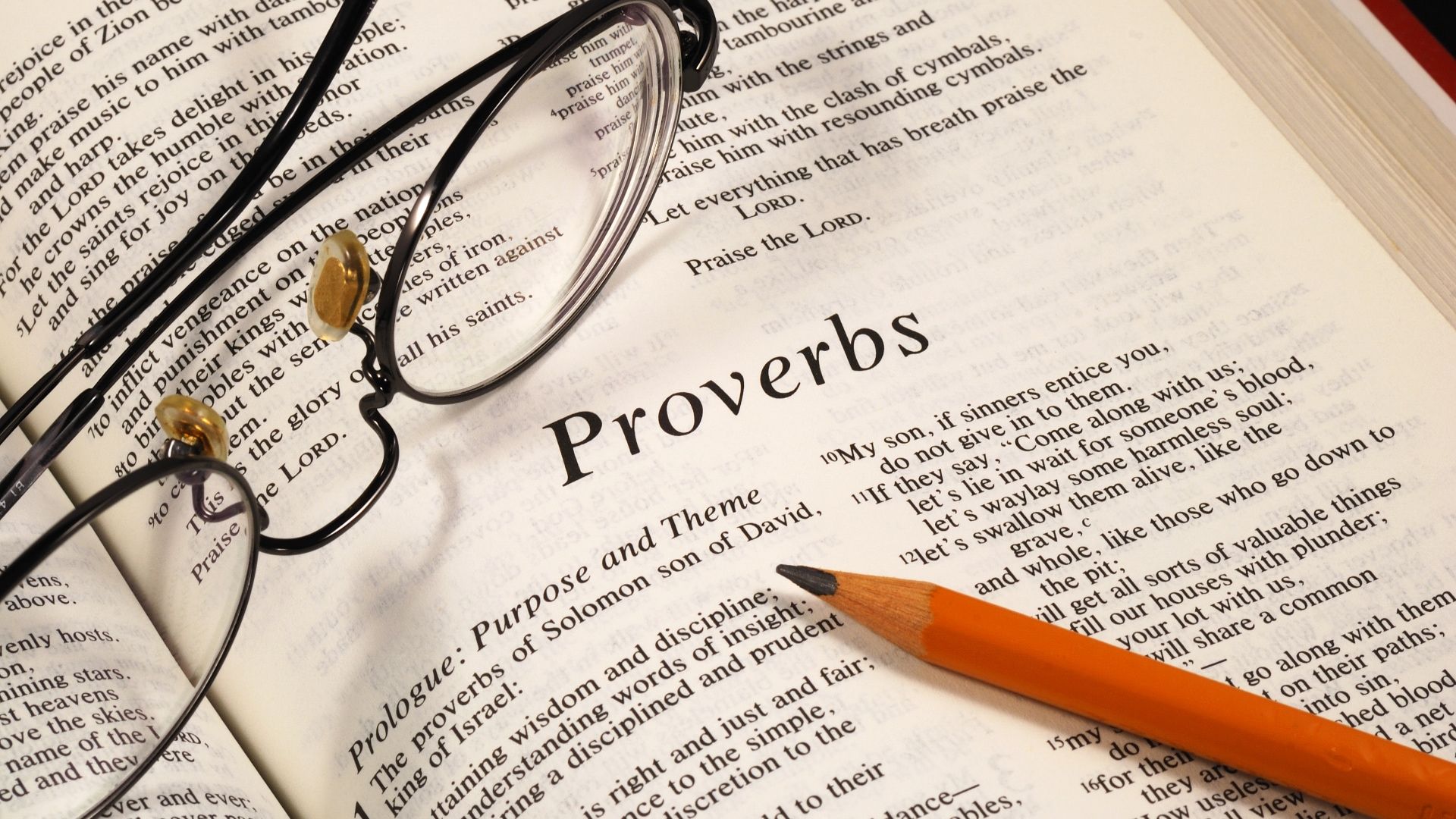Repairing Relationships (Proverbs)

We're in our second last series on the book of Proverbs today. We've seen that Proverbs is a book about wisdom, and that wisdom is about living skillfully within the world that God has made. This is important, because we need to know not only what is moral or right. We also need to know what is wise. This is exactly what Proverbs offers us: insight into not only what is right, but what is actually going to lead to skillful living and wise decision-making in our lives.
Today we're in the last topic we're going to cover from Proverbs, and it's the subject of broken relationships. Most of you here know the pain of a relationship that's fallen apart: a friendship, a marriage, or even a working relationship. If you've experienced this, then you know the deep feelings that surface that can linger for years, and that can actually take you by surprise, feelings of betrayal, hurt, and anger. We can live with the consequences of broken relationships for years, even our entire lives.
What does Proverbs tell us about how to handle broken relationships? Three things. First, the seriousness of broken relationships. Second, how to respond to broken relationships. Third, where to get what we need to deal with broken relationships.
First, Proverbs tells us how serious broken relationships really are.
One of the biggest mistakes we could ever make is to underestimate the seriousness of this issue. So Proverbs is very blunt about what a serious matter it is when relationships are broken. This doesn't just apply to deep friendships; it also applies to even casual relationships.
For instance:
Starting a quarrel is like breaching a dam;
so drop the matter before a dispute breaks out.
(Proverbs 17:14)
A brother wronged is more unyielding than a fortified city;
disputes are like the barred gates of a citadel.
(Proverbs 18:19)
Stone is heavy and sand a burden,
but a fool's provocation is heavier than both.
Anger is cruel and fury overwhelming,
but who can stand before jealousy?
(Proverbs 27:3-4)
An angry person stirs up dissension,
and a hot-tempered person commits many sins.
(Proverbs 29:22)
If you've ever opened a can of soda pop that's been shaken, you know what it's like to be surprised by all this fizz that's suddenly spraying you and spilling all over. That's what broken relationships are like. Proverbs compares them to a dam that's breached. Once that breach starts, it's hard to control and bring to an end. It easily gushes out of control. It's like coming up against a fortified city. At one time the gates might have been open to you, but you may find it hard to break past the barriers that and reestablish a relationship. It's like a cruel and furious storm. And in the middle of all of this – the lack of control, the raised defenses, the stormy emotions – it's hard not to end up committing many sins. And these are only a sample of the Proverbs that talk about the seriousness of this issue. Conflict can damage relationships and our reputation, exhaust us, imprison us in attitudes of resentment and bitterness, and spill over and damage every part of our lives.
The application of these verses is clear. Look again at the first Proverb I quoted, found in Proverbs 17:14:
Starting a quarrel is like breaching a dam;
so drop the matter before a dispute breaks out.
Now don't mistake what Proverbs is saying here. It's not saying to always smooth over issues and never deal with them. Last week we looked at one of the qualities of true friendship, which is candor and even confrontation of our friends for their own good. Proverbs is not saying to just bury your head in the sand and to never confront another person or deal with issues. But it is saying that we need to carefully weigh whether or not it's worth entering into conflict, because conflict is a serious issue, and there is always damage. There are always casualties.
Proverbs 15:18 says:
The hot-tempered stir up dissension,
but those who are patient calm a quarrel.
Proverbs 19:11 says:
A person's wisdom yields patience;
it is to one's glory to overlook an offense.
Ken Sande, author of The Peacemaker, suggests asking, "Is this really worth fighting over?" Given the cost of conflict, isn't it better to overlook minor offenses? The best way to deal with broken relationships, according to Proverbs, is to do everything we can to avoid damaging relationships, because broken relationships really are a serious matter.
Now I know that despite all of this, there are times in which a broken relationship is unavoidable. Maybe you've tried everything you can, but it's too late. Maybe the other person has damaged the relationship despite your best efforts. Or maybe it's already too late.
What does Proverbs say about handling broken relationships?
A lot, actually. Let's cover a few.
The place we absolutely have to begin is with humility. In other words, in conflict I tend to become self-righteous and proud, and look down on the other person. As Miroslav Volf said, we tend to "exclude the enemy from the community of humans even as I exclude myself from the community of sinners." The place to begin, then is, as Volf says, is to remove "the enemy from the sphere of monstrous inhumanity" and to move myself "from the sphere of proud innocence into the sphere of common sinfulness."
Proverbs 11:12 says:
Those who have no sense deride their neighbors,
but those who have understanding hold their tongues.
The word deride there means to belittle or to show contempt for someone else, to look down on them. It reflects an attitude of pride and judgmentalism, which is exactly the attitude we tend to have in conflict. Pride has no place in conflict, especially when we see ourselves as we really are.
Proverbs 14:3 says:
A fool's mouth lashes out with pride,
but the lips of the wise protect them.
Proverbs 20:9 says:
Who can say, "I have kept my heart pure;
I am clean and without sin"?
The implied answer is, "Not me." The wise person recognizes how far from perfection they are, and that they have no business acting self-righteously. When we see ourselves as we really are, we have no business looking down in pride at another person. The place to begin in a broken relationship is not with the other person, but with ourselves, in dismantling our own pride.
Secondly, Proverbs tells us to absorb the offense. This will take a little bit of explaining. Proverbs 10:12 says:
Hatred stirs up dissension,
but love covers over all wrongs.
Proverbs 17:9 says:
Whoever would foster love covers over an offense,
but whoever repeats the matter separates close friends.
In these verses there's a contrast. On one hand, we can be hateful, and we can repeat what happened to ourselves and others. This is our normal way of responding when someone wrongs us. We get agitated, we stir things up, and we keep reminding ourselves and everyone else about what happened. The only alternative, according to these verses, is to cover over the wrong.
What does cover mean? It's the opposite of stirring things up. Instead of exaggerating the faults, it means looking for ways to make them disappear. Bruce Waltke, who wrote an excellent commentary on Proverbs, says:
Instead of placing the transgressor on stage and withdrawing the veil to expose his faults and so exact revenge, love endures his wrongs to reconcile him and save him from death and to preserve the peace. Love withdraws the burning wood of gossip…
Now, if you do this, you realize that you're no longer expecting the other person to pay for what they've done. In a sense, you're paying for it. You're absorbing the hurt and the pain of the wrong actions they did. You're not rehashing it, you're not inflicting revenge. Instead, you're absorbing the pain. In a sense you're bearing the cost of the wrong that they've done.
Then Proverbs gives us the well-known advice to overcome evil with good. Proverbs 25:21-22 says:
If your enemy is hungry, give him food to eat;
if he is thirsty, give him water to drink.
In doing this, you will heap burning coals on his head,
and the LORD will reward you.
One man tells the story of having lunch in McDonald's with his daughter and mother-in-law. They were enjoying a pleasant conversation when a man, with his wife and children, plopped down at a nearby table. The man was someone who in the past had hurt him. They faked pleasantries and exchanged hellos, but he could feel his blood begin to boil at the thought of what this other man had done to him.
They gobbled down our food and on the way out of the restaurant overheard his "enemy" and his wife arguing because neither had any money to purchase the food they had ordered. Their three kids were screaming for their Happy Meals. The couple was embarrassed. His first thought was, "Praise God, there is justice in this world. He deserves every bit of embarrassment he's feeling, and I'm so glad I got to see this."
Suddenly God spoke to him through the text he had read that morning in Romans, which was based on the proverb we just read.
Do not repay anyone evil for evil. Be careful to do what is right in the eyes of everyone. If it is possible, as far as it depends on you, live at peace with everyone. Do not take revenge, my dear friends, but leave room for God's wrath, for it is written: "It is mine to avenge; I will repay," says the Lord. On the contrary:
"If your enemy is hungry, feed him;
if he is thirsty, give him something to drink.
In doing this, you will heap burning coals on his head."
Do not be overcome by evil, but overcome evil with good. (Romans 12:17-20)
Listen to what this man says of that moment:
God was saying to me: Here's your chance to be set free of your pain and overcome your hurt. I knew I had a choice either to obey or bask in my bitterness. Somewhat reluctantly I reached into my wallet, pulled out $20, and gave it to this man who had been my enemy. "Have lunch on me."
Is there a place for rebuke? Yes, as we've seen in other Proverbs. But when a relationship is broken, the way of wisdom is to respond with humility, with a willingness to absorb the pain of the offense, and then a willingness to bless the other person.
You may say that you don't feel like doing this. What I love about Proverbs is that we don't have to feel like it in order to take these steps. When wronged we'll never feel like doing these things. But it's got nothing to do with feelings. When we follow the wisdom of Proverbs, we'll find that eventually the feelings do follow. In one of his writings, C.S. Lewis says "last week, while at prayer, I suddenly discovered – or felt as if I did – that I had really forgiven someone I had been trying to forgive for over thirty years."
This is what we need to do, but it leaves us with a question.
The question is where we can find the power to do all of this.
Becky Pippert tells the story of tells the story of auditing a course at Harvard on counseling. In one of the case studies the therapist used a technique called psychodynamic psychology. In this particular case the therapist helped uncover a hidden hostility he had toward his mother.
The professor moved on, but Pippert wasn't satisfied. She mustered the courage the raise her hand and asked, "Let's say the patient returned a few weeks later and said, 'I'd like to get beyond my anger. I'd like to be able to love her and forgive her. How do I do that?' How does psychodynamic psychotherapy help a person with a request like this?"
There was silence. Then the professor answered, "I think the therapist would say, 'Lots of luck!'" You see, psychodynamic psychotherapy can surface the problem, but it can't tell us how to love our enemy. Pippert writes, "After we see the need to change, how do we find the power to do it?" (Hope Has Its Reasons)
The answer is that we follow a God who has forgiven us in this exact way. He humbled himself, even though had no reason to be humbled. Philippians 2 tells us that Jesus, the Son of God, "humbled himself by becoming obedient to death—even death on a cross!" (Philippians 2:8). He absorbed our sins, every sin that we have committed, past, present, and future. Isaiah 53:6 says, "The LORD has laid on him the iniquity of us all." And he overcame our evil with ultimate good. "But God demonstrates his own love for us in this: While we were still sinners, Christ died for us." (Romans 5:8) He's also given us his Spirit to change our hearts, to change our hearts like nothing else will.
Jesus taught us that when we understand how much we have been forgiven, we will be ready to move towards forgiving others. If we aren't in the process of forgiving others, then it's an indication that we haven't grasped the expanse of God's forgiveness of us.
Broken relationships are serious. They're deadly. But we can move toward forgiveness as we humble ourselves, absorb the pain of what others have done, and as we repay evil with good. The best, the only way, to do this is to experience God's forgiveness ourselves.
Let's pray.
Father, I pray for those of us who are experiencing the pain of broken relationships today. I pray that you would humble us so that we don't look down on the person who wronged us. Enable us to absorb the pain rather than inflict it upon them. I pray that we would take the opportunity to overcome evil with good.
You know that nobody here can do this on their own strength. So I pray that you would bring us to the foot of the cross. Help us see Jesus, and the weight of our sin that he bore. May we turn to him and marvel that God himself bore our sins. And may our hearts therefore change so that we are freed to forgive others. In the name of Jesus we pray, Amen.





